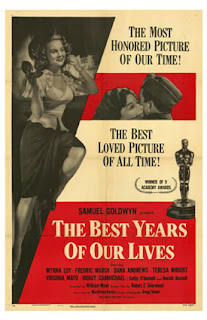


This film is directed by William Wyler, and displays the difficulties of 3 servicemen to readjust to home after returning from World War 2. From all of them, Al is the luckiest one, being surrounded by 2 strong women in the face of his wife and daughter Peggy and a secured job waiting for him. Despite having these wanderful things at home, he still doens't feel comfortable and refuses to accept his children have grown up and are much more responsible since he last saw them. Al is childish in a comic way, especially in situations with a drink in his hand when he looks the happiest. His wife is next to him all the time, making sure he's ok and providing all the support he needs.
Homer, the youngest of all, has lost his arms during the war and has hooks as replacements. His readjustment seems the most difficult one, because he feels like a burden to his family and future wife Wilma. Homer remains blind to their complete love and support for a long time, but when he faces his own problems and insecurity he finally lets Wilma closer to him.
The three fellows often see each other. Their spot is a pub which Homer recommends, and in fact they, end up there on the very first night. Fred, who has reached a high rank during the war and has exceptional achievements, refuses to come back to the pharmacy where he has previously worked. He meets Peggy, Al's daughter, at the pub where they end up by chance. She is very different from his wife, much more tactful, caring and stepped down to earth. As his wife sees in him only the "smooth pilot" who she has fun with, when the money is gone she is off too. The best years of her life, are in fact, the years when he was gone and she was living in luxury. Peggy accepts him the way he is, with a low paid job and no fancy officer clothes. I really wanted them to end up together ever since they met! When the wife was introduced I got a bit worried.. but luckily it moved forward in the right direction as everyone hoped.
In "The best years of out lives" many details are omitted, others are summed up in one shot, but the audience is clever enough to figure out the whole plot and doesn't suffer during the two and a half hours at all! Brilliant ideas that we could all benefit from- like the long deep focus shots. They save up time and most of all bring style to the who film.
Just to mention that Peggy is played by Teresa Wright, who I've watched in "Shadow of a doubt", my first Hitchcock film :)

No comments:
Post a Comment